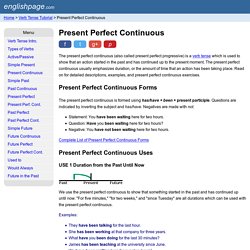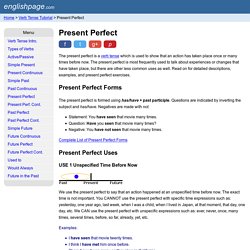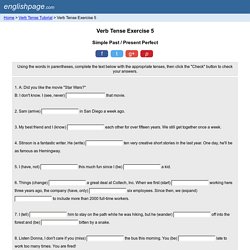

Present Perfect Tense,Continuous Exercise,Progressive,Simple Past,ESL Quiz,Grammar Exercises. Present Perfect Tense Quiz. Present Perfect or Past Tense (A-4-ESL) Medical Advice: What's the Matter? Name several illnesses that keep people from going to work or school. Then, discuss the symptoms for each and remedies and treatments for curing the problem. Listen to the conversation by pressing the "Play" button and then answer the questions. [ Other Audio Options: Play RealMedia | Play Window Media ] Listen to the conversation again as you read the Quiz Script. Think of a time during the last year when you got really sick. What home remedies do you have in your country for the following illnesses or situations?
Coldstomachachehangoverhiccupssore throat Want to Tell People About This Listening Activity? Now, write your opinions on a similar topic at Randall's ESL Blog HERE. Randall's Sites: Daily ESL | ESL Blog | EZSlang | Train Your Accent | Tips For Students | Hiking In Utah. Present Perfect Continuous. The present perfect continuous (also called present perfect progressive) is a verb tense which is used to show that an action started in the past and has continued up to the present moment.

The present perfect continuous usually emphasizes duration, or the amount of time that an action has been taking place. Read on for detailed descriptions, examples, and present perfect continuous exercises. Present Perfect Continuous Forms The present perfect continuous is formed using has/have + been + present participle. Questions are indicated by inverting the subject and has/have. Statement: You have been waiting here for two hours.Question: Have you been waiting here for two hours?
Complete List of Present Perfect Continuous Forms Present Perfect Continuous Uses USE 1 Duration from the Past Until Now We use the present perfect continuous to show that something started in the past and has continued up until now. Examples: They have been talking for the last hour. USE 2 Recently, Lately. Verb Tense Exercise 7. Verb Tense Exercise 8. Past participles of English verbs 1 - Choose the correct past participle. ENGLISH GRAMMAR ONLINE TEST topic: VERB TENSES: Past participles 1 | level: Beginner Fill in each blank space with the correct past participle for each verb.
EX: write-->written: Back to list of exercises OFFICIAL ENGLISH TESTS: The Eiken Test in Practical English Proficiency and the United Nations Associations Test of English (UNATE) - Japan The Eiken Test in Practical English Proficiency is an English language test administerd by the Society for Testing English Proficiency (STEP), a non-profit organization, and its use is supported by the Japanese government. The United Nations Associations Test of English (UNATE) is a Japanese standardized test of both the English language and facts about the United Nations.
Present Perfect. The present perfect is a verb tense which is used to show that an action has taken place once or many times before now.

The present perfect is most frequently used to talk about experiences or changes that have taken place, but there are other less common uses as well. Read on for detailed descriptions, examples, and present perfect exercises. Present Perfect Forms The present perfect is formed using has/have + past participle. Questions are indicated by inverting the subject and has/have. Statement: You have seen that movie many times.Question: Have you seen that movie many times? Verb Tense Exercise 5. 1.

A: Did you like the movie "Star Wars? " B: I don't know. I (see, never) that movie. 2. Sam (arrive) in San Diego a week ago. 3. 4. Verb Tense Exercise 6. Since computers were first introduced to the public in the early 1980's, technology (change) a great deal. The first computers (be) simple machines designed for basic tasks. They (have, not) much memory and they (be, not) very powerful. Early computers were often quite expensive and customers often (pay) thousands of dollars for machines which actually (do) very little. Most computers (be) separate, individual machines used mostly as expensive typewriters or for playing games. Adult literacy resources (ESL/vocabulary): Doctor/Illness 2. Adult literacy resources (ESL/vocabulary): Doctor/Illness 1.